
The Hospital and Clinical Safety Program under the Environmental Health and Safety Department oversees and coordinates efforts to maintain a safe work environment at the UTHealth Clinics, the Harris County Psychiatric Center (HCPC) and the UTPhysicians Clinics. The program ensures compliance with institutional, local, state, and federal environmental, health, and safety regulations, including CMS, CLIA, TCEQ, EPA, and Joint Commission hospital accreditation requirements in the area of Environment of Care, Life Safety, and Emergency Management.
EHS Main Office 713-500-8100 (answered M-F, 8:00AM-5:00PM CST)
EHS Hotline 713-500-5832 (after hours, weekends, holiday for the on-call safety specialist)
For Emergencies, Dial UT Police Dispatch 713-792-2890 or 911
UTPhysicians
Policies
UT Health Environmental Health and Safety has tailored policies specific to the needs of UTPhysicians based on UTP administrative policies, UTHealth HOOP polices, UTHealth EHS guidance documents, local, state or federal requirements and best practices for quality and safety.
The most current version of UTP EHS policies and associated forms can be found on UTP Clinical Resources.
Reporting a Worker Injury
UTHealth maintains Workers’ Compensation Insurance (“WCI”) through UT System as part of a self-administered/self-insurance plan. This plan provides necessary and reasonable medical coverage and income benefits payments to employees who sustain injuries or occupational disease while in the course and scope of employment. Some of the employee benefits are: Disability income, medical expense reimbursement, and rehabilitation services.
UTHealth as the employer has a duty of care to you the employee to: provide a safe place to work, provide competent fellow employees, provide safe tools and equipment, warn employees of inherent dangers and make and enforce rules for the safety of all employees.
Disposal of Expired Medication
Medications (Pharmaceuticals) can be classified as non-hazardous and hazardous.
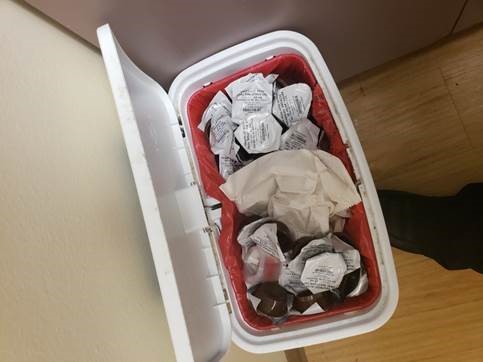
Hazardous Medication PPE - No Medicine should be placed in the trash. At HCPC and DCB, please create a FSR when full for house-keeping and they will replace it with a small red bio hazard container. Hazardous pharmaceuticals must be disposed in a specific manner and should be reviewed by UTH EHS (Environmental Protection) for disposal instructions. The following list are the most common hazardous medications EHS has encountered at clinics. If you need to dispose of medications, please contact the HCPC and DCB Safety team at 713.741.3894 or 713.741.4811. You can also contact Environmental Protection Program at 713.500.5837.
Antineoplastics
Thimersol or phenylmercuric acetate (vaccines, eye drops, nasal spray, Influenza vaccine or Meningococcal Polysacharide with thimerosal preservative)
Nicotine
Racepinephrine & Primatene aerosol inhaler
Aluminum chloride hexahydrate
Unused silver nitrate applicators
Benzoin Tincture
Ethyl chloride (topical spray)
Non-hazardous pharmaceuticals can be disposed of in the white non-hazardous pharmaceuticals boxes supplied and picked up by Stericycle.
Compressed Gas at HCPC
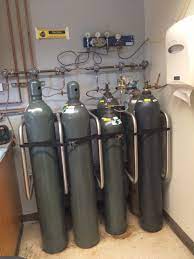
Gas Cylinders are under pressure and if not secured properly, have the potential to travel like an uncontrollable rocket.
- You must ensure all compressed gas cylinders are properly secured in an upright position
- The cylinders must be transported with the proper carts and stored on carts in manner that does not cause it to tip or fall when moving.
- Do not attempt to repair valves or their relief valves or their relief devices
- Remove from service, Tag and Report leaking cylinders or cylinders with stuck valve. These cylinders must be transferred to a safe and secure location.
Helpful Links
Safety, Health, Environment, and Risk Management
HCPC Main Site
HCPC Policies and Emergency Operations Plan (EOP)
HCPC Safety Policies
HCPC Web Forms and FSRs
Joint Commission Resources
Joint Commission
Safety Data Sheet
EMResources
EMTrack
WebEOC
Point of Care Testing (POCT)
Point-of-care testing (POCT) is defined as medical testing at or near the site of patient care. The goal of POCT is to collect the specimen and obtain accurate results in a very short period of time at or near the location of the patient. POCT is often accomplished through the use of transportable, portable, and handheld instruments.
The main aim, and benefit, of POCT is to bring the test conveniently and immediately to the patient. This increases the likelihood that the physician and care team will receive the results quicker, enabling clinicians to support the timely diagnosis, monitoring and treatment of patients. (Read more...)
Malfunctioning Medical Equipment at HCPC
- REMOVE the equipment to prevent its use
- TAG IT
- REPORT IT- Create an FSR (Medial Equipment Request)
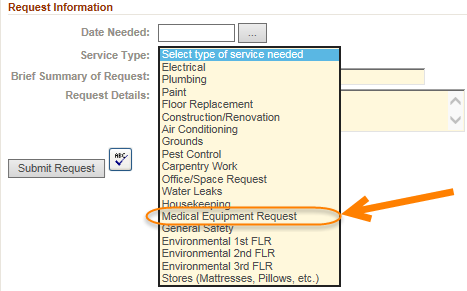
Training
Initial Clinical Safety Training – Required ONCE as part of New Employee Orientation. Required for all employees.
Annual Refresher Clinical Safety Training – Required ANNUALLY, beginning 1 year after completion of Initial Clinical Safety Training. Required for all employees.
Medical Waste Shipping Training – Any employees that prepare medical waste materials for transportation or sign the waste transport manifest papers (Stericycle receipt) – Training is good for 3 years.
Please contact the Safety team at HCPC at 713.741.3894 or DCB at 713.741.4811 for more information about his training.
Questions regarding University Online Learning platforms?
Contact Stephen David at 713-500-5858
or contact our main office at 713-500-8100
For quick access to University Online learning platforms:
Safety Assistant LMS Available to all University Student's, Resident's, Employee's, and UTPhysicians Employee's.
Learn2Succeed Available to all University Employee's and UTPhysicians Employee's.
Hospital and Clinical Safety Staff
 |
Cynthia Crespo-Bonaparte, MS, MIE, CSSGB, Safety Manager [email protected] B.S.: Pontifical Catholic University of Puerto Rico (Psychology) |
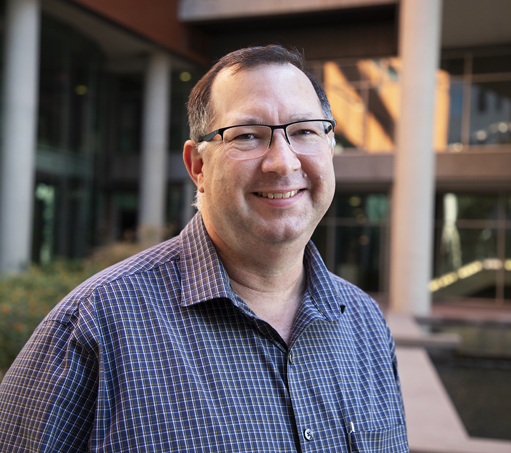 |
William Hebel, MPH, MB(ASCP)CM, Clinical Safety Coordinator [email protected] B.S. : University of Texas MD Anderson Cancer Center School of Health Professions (Molecular Genetics Technology) |
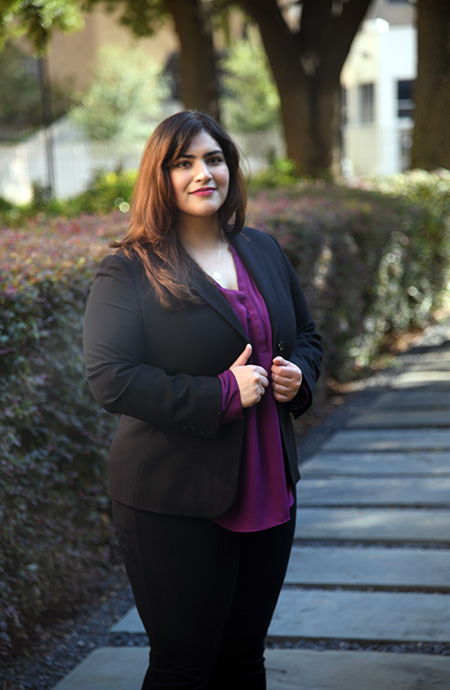 |
Kara Iqra Mirza, MPH, Clinical Safety Specialist [email protected] B.S.: Texas A&M University (Allied Health) |
 |
Charles Varghese, GSP, Safety Specialist [email protected] B.S.: University of Houston Clearlake (Safety and Industrial Hygiene) |
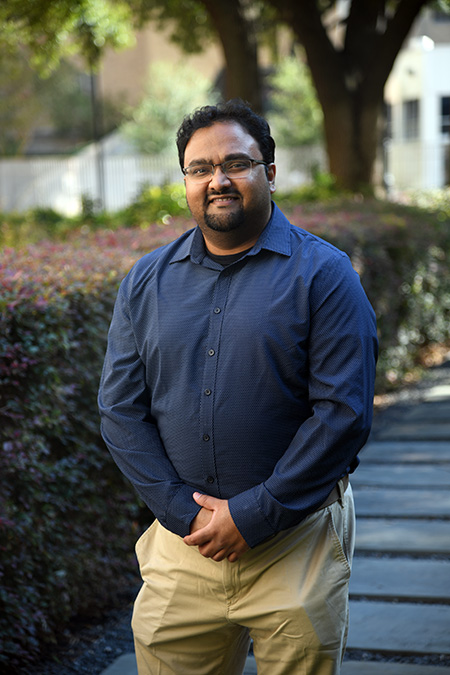 |
Sanketkumar “ Shawn” Shah, Safety Specialist
B.S. Health Science, University of Houston Main Campus |